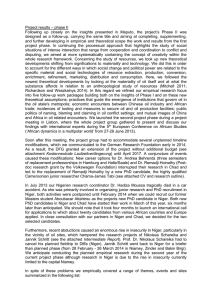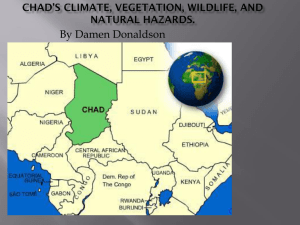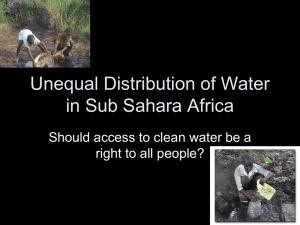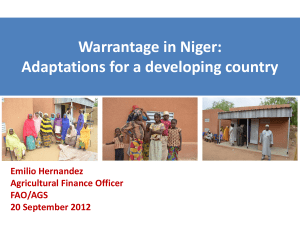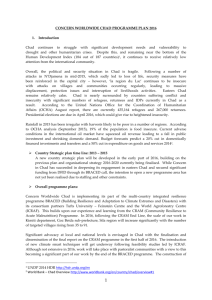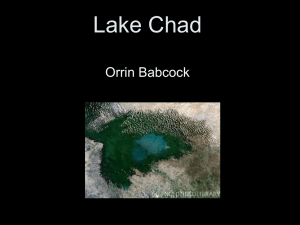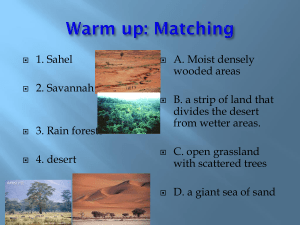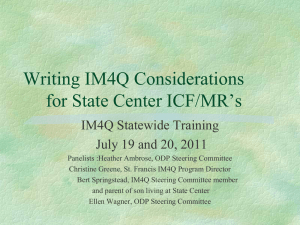Project results Phase I - Adaptation and Creativity in Africa
advertisement
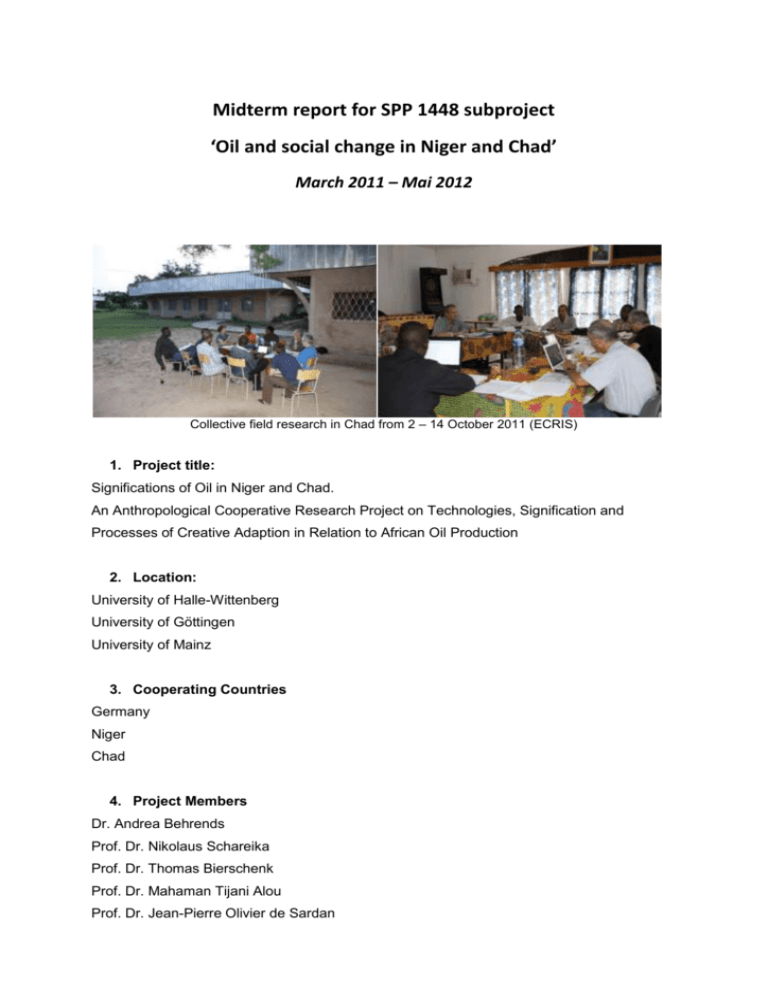
Midterm report for SPP 1448 subproject ‘Oil and social change in Niger and Chad’ March 2011 – Mai 2012 Collective field research in Chad from 2 – 14 October 2011 (ECRIS) 1. Project title: Significations of Oil in Niger and Chad. An Anthropological Cooperative Research Project on Technologies, Signification and Processes of Creative Adaption in Relation to African Oil Production 2. Location: University of Halle-Wittenberg University of Göttingen University of Mainz 3. Cooperating Countries Germany Niger Chad 4. Project Members Dr. Andrea Behrends Prof. Dr. Nikolaus Schareika Prof. Dr. Thomas Bierschenk Prof. Dr. Mahaman Tijani Alou Prof. Dr. Jean-Pierre Olivier de Sardan Dr. Hadiza Moussa Remadji Hoinathy Jannik Schritt Oubandoma Salissou (Master’s Student) Saadi Amar (Master’s Student) Aboubakar Attahirou (Master’s Student) 5. Summary of research problem for the first project phase (04-2011 to 03-2013) The first project phase addressed the increasingly important role of crude oil as a prime source of far-reaching societal and cultural transformation in Africa: Due to the diminishing availability of crude worldwide, hitherto untapped reserves are now exploited by the world’s most influential oil companies. Using this moment of upheaval as a methodological chance, the project follows the PP’s theoretical outlook in order to develop a distinctly anthropological and ethnographic perspective on the early formation phase of new oil states in Africa (Behrends & Schareika 2010, 2011). Oil-induced change is studied as in the making, at the level of concrete processes of social and political interaction that occur in manifold forms in various places and institutional environments, but that are clearly structured by the presence of oil. The project starts with the well-established knowledge provided by political economy studies of oil and uses it for conceptual guidance; but it then seeks to supplement this knowledge by focussing on practice as framed by particular institutions and significations and leading to contingent, locally specific outcomes. We define five fields of order thus generated by practice, namely 1) central governance and finance, 2) local governance, 3) resistance, 4) emerging oil zone communities, and 5) rural people’s responses to activities within the oil zone. The dynamics in these spheres of sociopolitical practice in the new African oil states are subsumed within a comprehensive framework and analytically prepared for comparison between Chad and Niger. In order to bring together theoretical, methodological and regional expertise from various sources, to intensify the cooperation between and among African studies centres in Germany and West Africa and to contribute to capacity building, the project is jointly executed by a German/Chadian/Nigerien research cooperative. Internal Cooperation Responding to the structural aims of the Priority Programme, the project has brought together researchers from several German Africa-oriented research institutions, notably the Seminar für Ethnologie, Halle/Saale (A. Behrends), the Institut für Ethnologie, Göttingen (N. Schareika) and the Institut für Ethnologie und Afrikastudien, Mainz (Th. Bierschenk). All three 2 research institutions combine a marked interest in general anthropological and sociological theory with a distinctly empirical preoccupation with processes of transformation in modern Africa. The Germen research institutions are joined by two important cooperating research centres in Africa: the Laboratoire d’Études et de Recherche sur les Dynamiques Sociales et le Développement Locale (LASDEL) in Niamey, Niger (M. Tijani Alou and J.P. Olivier de Sardan) and the Centre de Recherche en Anthropologie et Sciences Humaines (CRASH) in N’Djamena, Chad (R. Hoinathy). Methods The project started with the idea of using ethnographic methods of participant observation, situational analysis and extended case study in order to develop a processual view on technologies of governing and the manifold transformations that are characteristic of African oil states. Two newcomers to the world of oil, namely Niger and Chad, were selected in order to elucidate the decisive early moments in the reordering of social and political arrangements in an African oil state. Building upon already existing expertise on both African oil and the countries of Niger and Chad, five work packages were defined to cover the nodal points of oil production in Africa. The project’s five work packages correspond to the five fields of research mentioned above. They serve a heuristic purpose and have possibly to be rearranged according to realities encountered in the field. Upon completion of the project, the work packages will not be kept in their rigid form. In the first place they helped to clearly define loci of empirical research and organize issues to be studied. In the second place they serve as a basis for comparing oil-induced processes of change in the two countries Niger and Chad. 6. Empirical work The entire research team carried out two weeks of refining basic research concepts and collective field research in Chad from 2 – 14 October 2011. The collective study was multisited and research was conducted in N’Djamena (the capital), Douguia and Djermaya (near the oil refinery) and Bongor (a newly developing oil region). Based on the ‘Rapid Collective Inquiry for the Identification of Conflicts and Strategic Groups’ (ECRIS) a framework of questions was developed by the team and the research carried out collectively. This procedure allowed the research team to quickly establish a common point of departure and to sketch in broad approximation the empirical contours of oil age society in Niger and Chad (it was e.g. possible to determine relevant strategic groups and prevailing discourses on oil). The data was analysed also collectively by the whole project team and put in perspective according to the research-guiding work packages. 3 Jannik Schritt (PhD candidate, Göttingen) carried out nine months of field research in Niger, both in the oil state’s metropolis (Niamey) and in emerging oil cities (Zinder and Diffa) and communities (Bakin Birgi). In Niamey he conducted three months of field research in March, May, June and October 2011. This research was based on problem-centred interviews with representatives in state ministries and administrative bodies, in media stations and civil society associations. Jannik Schritt thus combined research on work package one “central governance and finance” with research on work package four “local governance” and work package three “emerging oil zone communities” that he carried out mainly in Zinder (where the Nigerien oil refinery has been newly opened) and partly in Diffa. He conducted six months of field research in Zinder (April 2011 and November – March 2012) and one week in Diffa (May 2011). His research on work package four “local governance” was based on problem-centred and biographic narrative interviews with local politicians, businessmen, civil society groups, media representatives and youth gangs. Jannik Schritt combined the classic ethnographic methods of participant observation and interviewing with the data collection method of participant audition in a local committee of civil society associations that worked on the topic of oil. The research on work package three “emerging oil zone communities” was conducted in the city of Zinder, in villages neighbouring to the oil refinery (Bakin Birgi) and in the city of Diffa. The data collection was based on narrative interviews about work experiences with oil workers and security agents and on daily experiences with villagers living close to the oil refinery. Remadji Hoinathy (PhD candidate, project partner in Chad) carried out four months of fieldwork research in Chad in 2011 and 2012 on work package three “emerging oil zone communities”. His research started in the villages around the first oil extraction site in Chad (Canton Béro), where the American based multi-national ExxonMobil’s influence is most evident. After completion of his PhD thesis in February 2012 he now continues to do research in the newly developed oil extraction site of Bongor – specifically among oil workers and in spontaneous settlements around the Chinese oil developments in Koudaloua, Chad (thus contributing to work package three “emerging oil zone communities”). Remadji Hoinathy was also instrumental in co-organising the group’s workshop in N’Djamena, Douguia and Djermaya and preparing the group’s collective research in Bongor. Oubandoma Salissou (Master’s student, Niger) carried out one week of preliminary field research in November 2011 in the villages of Bakin Birgi and Olelewa in the vicinity of the oil refinery. His research contributes to findings on work package three “emerging oil zone communities”. He participated as VIP among high ranking Nigerien politicians, foreign state representatives and Chinese company representatives in the festive celebration of the oil 4 refinery’s inauguration ceremony on 28th November 2011.1 He observed the “festivilisation” of Niger becoming an oil producing country. His findings contributed to work package one “modes of central governance and finance”. Salissou Oubandoma reviewed literature in preparation for his master’s thesis and prepared for further field research. Due to delays in the transfer of research funds, further empirical research is only starting now. Sa-âdi Amar (Master’s student, Niger) carried out two months of preliminary field research in N’gourti, Niger’s oil extracting region, on work package five “transformation of rural livelihoods and traditional chieftaincy in regions with oil extraction”. In his research he focused on traditional chiefs of ethnic Tubu and Arab who predominantly inhabit the region. He conducted participant observation and problem-centred interviewing with royal families and analyzed transformations in inter-ethnic relations between Tubu, Arab (and Fula people) as a result of administrative changes and high expectations to participate in the windfall gains of oil. Mahamidou Aboubacar Attahirou carried out 40 days of field research between 26 February and 7 April 2012 in N’gourti, Diffa region. Corresponding to Sa-âdi Amar’s research, Mahamidou Aboubacar Attahirou conducted research on work package five “transformation of rural livelihoods and traditional chieftaincy in regions with oil extraction” in the administrative department of N’gourti. He analysed the transformation of rural livelihoods in regard to the social (education, health and water supply) and the economic sector (trade, livestock farming and employment) using interviewing, focus group discussions and participant observation as his main methods. Mahamidou Aboubacar Attahirou reviewed the existing literature in preparation for his master thesis. Andrea Behrends (Principal Investigator and research group coordinator, Halle University) co-taught seminars on oil in Mainz (with Thomas Bierschenk) and Göttingen (with Nikolaus Schareika) and was main organiser of the inaugural meeting in Chad with the help of Remadji Hoinathy. After that meeting, she proceeded to her research site in Eastern Chad to continue her previous work on oil-related resistance movements, work package 2 “resistance”, and the ‘wider’ effects of oil and significations of oil in a region that is far remote from the actual extraction sites, but central for resistance activities (Behrends 2011). In her findings, development and local governance turned out to be key aspects of her research, which thus also contributes to work package 4 “modes of local governance, local politics and regional development”. In July 2011, she invited two key informants from Eastern Chad to Jannik Schritt also participated in the oil refinery’s inauguration ceremony among the public crowd. His findings will be included in work package 4 “modes of local governance, local politics and regional development”. 1 5 Halle and Berlin for an intensive two-week workshop/ research meeting on ‘social change in eastern Chad’. She supervises Remadji Hoinathy’s PhD thesis. Nikolaus Schareika (Principal Investigator, Göttingen University) taught two Master’s level seminars on oil (one with A. Behrends). He spent one month in south-western Chad in order to start empirical research on the social impact of oil production in the Koudalwa area where boreholes are owned and operated by the Chinese National Petroleum Company (CNPC). Research focused on the impact of oil production and oil rents upon rural populations including pastoralists and the relationship of local merchants with the sites of oil production. His work corresponds to work package five on the “transformation of rural livelihoods and traditional chieftaincy in regions with oil extraction”. His research made it particularly evident that this work package will, in the future, include actors that do not directly “belong” to the oil community, but act in its wider field of service provision. It also calls into question the immediate applicability of the enclave concept that has come to be widely accepted as suitable for analysing global oil. Mahaman Tijani Alou (Senior Project Partner, Niamey University and LASDEL) is dean of legal studies at the University of Niamey and advisor to the Nigerien president. His previous research on Nigerien political institutions and his insights into governmental policies particularly enriched the inaugural project meeting. As his research contribution to the project he proceeds to collect legislative texts and policy documents relating to the governmental and financial sector in Niamey, going back to 2008, which covers the significant planning phase of the oil project in Niger (including far-reaching changes in the arena of national politics, finance and governance). He also follows press debates on the fuel price fix in Niger, related to the opening of the Chinese-run refinery in Zinder. His work contributes to work package 1 “modes of central governance and finance”. A group research with M. Tijani Alou and the research coordinator of LASDEL, Dr. Hadiza Moussa, plus the three Master’s students is scheduled for August 2012. Thomas Bierschenk (Principal Investigator, Mainz University) has taught two classes on the anthropology of oil at Mainz University. After his participation at the research group’s inaugural workshop in Chad, he conducted a short-term research on a meeting of government agents, oil company representatives and potential investors in N’Djamena, Chad (in October 2011). Based on his previous studies on the African state, he continues to reflect about the local effects of rent-economies, in particular those based on oil, and the mystification of oil or oil’s magic. 6 Jean-Pierre Olivier de Sardan (EHESS Marseille and LASDEL), based on his extensive previous research on local government practices in Niger, focuses his research on the effects of oil rents on authoritarian states, particularly on their modes of governance and the continuous modification of what he calls ‘practical norms’, that is the incorporation of oil revenues into existing governmental practices (Olivier de Sardan 2011). His findings correspond to work package four “modes of local governance, local politics and regional development”. 7. First results Our preliminary results show that oil not only induces substantial transformations in the socio-political arenas of new African oil states, but completely restructures them. Some preliminary results pertain to the following: Rural communities experienced massive spatial and social re-ordering influenced by the disappropriation and restructuring of land in relation to the direct material oil-related technologies around the construction of oil wells, pipelines, roads, power stations, refineries etc. Likewise, social and political institutions of rural communities significantly changed following the influx of money due to temporary and selectively paid compensations (for land loss) and short term employment. The changes can be summarised under the headlines ‘monetisation of social relations’, ‘de-agriculturation’ and the creative development of strategies to ‘participate in the oil rent’ (Hoinathy 2012). Compensation payments and land expropriations lead to a new distribution of power in local webs of social relations. The positioning and re-assembling of existing political groups that we observed (oil company employees, local administration, chiefs, village populations, lawyers etc.) illustrates the opening of new spaces of disorder and re-ordering in the wake of oil production. We observed the secondary effects of oil. They relate, for instance, to the fact of rising security measures by central governments: newly armed police officers turn against pastoralists and contribute to large scale cattle theft – which in turn leads nomads to change transhumant routes, fleeing security forces back and forth through the country and across the border to the Central African Republic. 7 In a similar way, due to oil revenues at the central government’s (of Chad, in this case) disposal, international development aid is significantly reduced. Regions that for the last decades built their economy on development aid and related services (construction, trade etc.) thus lose a decisive form of income without direct replacement. Oil has a catalytic effect, particularly in the emerging oil-state of Niger, on the political re-ordering on a regional level, where political affiliation is reassembled along significatory practices in relation to oil. Oil, here, serves to stabilise opposing positions between supporters of the former, ousted president of Niger, who stylised himself as the “father of Nigerien oil” and his follower, who similarly uses oil as his main political argument for democracy and development. Furthermore, to mobilise resistance against the current regime, new technologies and travelling models are creatively adapted from the Arab Spring (chain SMS, renaming of central square, using media for resistance movements). To confront changes caused by the existence of oil not only new formations emerge, but old concepts of dealing with group conflict are also re-configured. Nomadic groups in Niger’s oil extraction zone of N’gourti put internal conflicts on hold to form a “tribal coalition” to give further weight to their claims of participating in oil revenue distributions. Comparison between the two countries proved to be of greatest value to single out similarities and specific differences between Niger and Chad: our research in Chad, as the ‘older’ oil producer, made it possible to follow up on first, a phase of resistance and civil war, and second, a new phase of national construction and consolidation of central authority. In Niger, we could observe the first oil-related changes as in the making. 8. Re-focusing the research question With respect to these preliminary findings, some minor changes and amendments have been made and will affect the remaining project phase (until April 2013): While we anticipated focusing on American oil companies in Chad and Chinese companies in Niger, we now include new Chinese oil developments 8 in Chad. A new focus will be on service providers, like African traders and on significations of ‘China’ (Schareika, Hoinathy). This expansion of the oil zone community calls into question established concepts like ‘enclave economies’ as not including some of the more encompassing adaptations to oil extraction in a particular area. The focus on ‘resistance’ (Behrends) will include the on-going effects of the recent peace agreement between Sudan and Chad, which resulted in the instalment of a joint Chadian-Sudanese military force, the (temporal) cessation of direct rebel activities and violence and the withdrawal of international military missions (UN Mission in the Central African Republic and Chad, MINURCAT) as well as large parts of humanitarian aid. The research around the oil refinery of Zinder has also been amended in the following ways: it proved important to include civil society groups and their political activism as an essential element of social disorder as well as practices of re-ordering (Schritt 2012). While it was initially foreseen to include both, the production sites of N’Gourti (some 450 km to the north-west of Zinder) and the refinery into one package, they now have come to be regarded as two separate arenas of research. The focus on central and on local governance will further elaborate on the technologies of governing, which includes the practice of consolidating power in the hands of a very small circle (particularly in Chad). This will include the effects of the Libyan revolution, into which Chadian as well as Nigerien forces were involved. The particular forms of adapting communication technologies as models travelling from Arab Spring movements into Niger will also be considered along these lines. 9. Subject-related, regional, theoretical and methodological proximity or contrast to other PP sub-projects During the two priority program meetings in Berlin (12/2011) and Mainz (05/2012) and a workshop on ‘Spheres of Exchange Unlimited’ (organizers A. Behrends, N. Schareika, S.J. Park and Th. Bierschenk) at the German Anthropological Association’s (DGV) conference in Vienna (09/2011) as well as during individual encounters with researchers from other subprojects we elaborated the following lines of mutual theoretical proximity and bases for future cooperation with some of the PP’s sub-projects: 9 Cooperation with subproject ‘Translating Adaptation to Climate Change’ Significations of climate change as well as oil production display a distinct relation to future scenarios. People talk about and make use of concepts that evoke the negative impact of climate change when it is not yet an observable reality. Similarly, great hopes for development and economic growth thrive where oil production has not yet started. This belief in oil’s positive capabilities is closely related to the construction of existing oil reserves (‘how much oil is still there?’), a discourse that links economic interests and public fears in regard to high prices for crude oil derivates. On the other hand, both climate change and oil translate into a strategy of naming, blaming and claiming, which essentially re-orders beliefor social reference systems. While, for instance, certain strategic groups might previously have signified a drought as “God’s punishment” following e.g. dispute within the local community, the climate change discourse is appropriated in order to externalise the question of ‘who’s guilty?’ and, thus, prepares and legitimizes struggles of claiming compensation payments from the industrialized world. In the field of oil one can observe various groups that name or signify oil in various ways – as ’the nation’s wealth’, ‘a local community’s asset’, ‘a cursed resource’, “a risk of health”, or “a means to development” – in order to set blames against strategic opponents and formulate claims for benefits from oil rents. Both research groups share an interest in societal negotiations about resources and their appropriation. These negotiations are about who has the authority to signify an element of ‘nature’ as a resource, who may claim a right to use it, and under which conditions. In the case of oil, its character as a resource is quite obvious, whereas in the case of climate change it is not the climate as such, but the international financial programs to support adaptation to climate change that have to be considered as a newly created resource. The two research projects agreed to jointly work on the connections between a) significatory practices in the domain of environmental and resource issues, b) the moral sphere of constructing blames and c) the political sphere of making and justifying claims. It is planned to hold a workshop at the end of 2012 with the aim of exchanging empirical results and further developing the theoretical concept. Cooperation with subproject ‘Entrepreneurial Chinese Migrants’ The idea of blaming also relates our research to the project on Entrepreneurial Chinese Migrants. We found that rumours about Chinese’ mistreatment of workers, low wages, and racial prejudices were found in entrepreneurial / market situations as well as in relation to Chinese oil exploration. We further identified as common to both projects the influence of particular external actors on spatial re-ordering. K. Giese and L. Marfaing have looked at the 10 establishment of Chinese settlements and related economic activities. To them our project’s focus on the micro- as well as meso level re-ordering in relation to Chinese as opposed to American oil companies is of great interest. Their results about Chinese and African merchants’ mutual adaptation of trade practices (without direct cooperation) runs parallel to our findings concerning African traders adapting to Chinese oil workers’ needs in a newly created oil worker settlement in Chad. A systematic follow-up and exchange of data concerning our respective findings is anticipated for the remaining months of the first research phase. In a possible second phase, direct research cooperation shall enhance this exchange: we identified the interest in African ‘Images of China’ in contrast to Chinese ‘Images of Africa’. While we collected numerous rumours and images of China among Chadian and Nigerien bureaucrats, villagers or oil workers – and could thus reconstruct their significations of China, we did not succeed in accessing the Chinese side. For a second project phase, K. Giese offered his expertise to trace Chinese oil workers who had been to Chad and Niger (via their ‘QQ’ communications) in China and possibly interview them about the impressions they gathered while working for oil companies in Chad. These findings would greatly enhance our understanding of the “new merchants and entrepreneurs of the global south” and the encounters we observed and analysed. The two subprojects agreed to exchange knowledge, expertise and contacts that are needed to elucidate the political processes in China that define and strategically address China’s economic, social and cultural appearance in Africa, particularly concerning the development of oil production. Cooperation with subproject ‘Roadside and Travel Communities’ / ‘Translating Global Health Technologies’ Spatial reordering is a key term in relation to K. Beck’s and G. Klaeger’s project on African Roads that gives special attention to the notion of truck stops as “mediating institutions” or boundary- and translation zones between road and village. For roadside communities, this spatial re-ordering is true on a longer-term basis. Comparable to these “mediating institutions” we have studied spontaneous villages of (mainly Nigerian and Cameroonian) migrants who look for work opportunities with (Chinese and American) oil companies. The work of Remadji Hoinathy shows, how these villages initiate social re-ordering with new styles of dressing, possibilities to spend incomes also accompanied by prostitution and a higher risk of attracting SCD like HIV AIDS. Quite similar to K. Beck’s truck stops, the spontaneous villages mediate change between oil ‘enclaves’ and the oil regions’ villages. 11 Cooperation with African Political Cultures We developed a direct link to the ‘political culture’ concept that is the focus of G. Klute’s, E. Macamo’s and T. von Trotha’s subproject. Jannik Schritt’s research on oil politics in Zinder asks, if the production of disorder could not be interpreted as the result of ordering processes (e.g. anti-government destabilization versus power-consolidating governance technologies) that are embedded in social logics of negotiation, gift-giving, solidarity, predatory authority and redistributive accumulation that renders politics cultural and culture political (Schritt 2012c). T. Hüsken’s research directly links up with our project, as he intends to include the effect of the renewed oil production within the area of his research. In preliminary talks, we found that it is of particular interest to both our projects to compare the political, economic and social significations of oil and their effects on practice within regions of Libya, as one of the oldest African petro-states, and the newcomer petro-states of Chad and Niger. 10. Further Cooperation and Exchange Direct lines of content-related cooperation between the PP’s sub-projects have been made explicit above. Our project’s contributed to cooperation within the PP in the following ways: The oil project’s three principal investigators, Andrea Behrends, Nikolaus Schareika and Thomas Bierschenk cooperatively organised a panel at the German Anthropological Association’s (DGV) meeting with Sung-Joon Park (Global Health) in Vienna 2011 Our project partner Jean-Pierre Olivier de Sardan (LASDEL Niger) will discuss eight PhD projects from various sub-projects (Global Health, Political Cultures, Climate Change, Policing, and Urban Planning) at the up-coming meeting of the German African Studies Association’s (VAD) meeting in Cologne 2012 funded by the central project (Rottenburg) Invited presentation of preliminary results in Bayreuth (A. Behrends, N. Schareika) Presentation of results during panels organised by our project group (S. J. Park, K. Beck) 12 Exchange during PP meetings in Berlin and Mainz (A. Behrends, N. Schareika, Th. Bierschenk, R. Hoinathy) External cooperating partners: Christine Fricke (Mainz) Annika Witte (Göttingen) Stephen P. Reyna (U of Manchester, UK) Saulesh Yessenova (U of Calgary, CA) Veronica Davidov (U of Leiden, NL) Gisa Weszkalnys (U of Exeter, UK) Tanya Richardson (U of Waterloo) References Behrends, Andrea 2011. ‘Fighting for oil when there is no oil yet. The Darfur-Chad border.’ In Andrea Behrends, Stephen P. Reyna and Günther Schlee (eds.) Crude Domination. An Anthropology of Oil, 81-106. Oxford, New York: Berghahn. Behrends, Andrea & Nikolaus Schareika 2010. ‘Significations of oil in Africa or what (more) can anthropologists contribute to the study of oil?’ Suomen Antropologi: Journal of the Finnish Anthropological Society 35 (1): 83-86. Behrends, Andrea & Nikolaus Schareika 2011. ‚Öl, Staat, Ressourcenfluch’. In: Auf dem Boden der Tatsachen. Festschrift für Thomas Bierschenk, eds. Nikolaus Schareika, Eva Spies and Pierre-Yves Le Meur. Köln: Rüdiger Köppe Verlag, 465-476. Hoinathy, Remadji 2012. ‘Pétrole et Changement Sociale. Rente pétrolière, déagriculturation et monetisation des interaction sociale dans le Canton Béro au sud du Tchad’. Unpublished PhD Thesis, Seminar für Ethnologie, University of HalleWittenberg. Olivier de Sardan 2011. ‘Auth-rent States, bureaucratic mode of governance and practical norms, in West Africa and beyond.’ Unpublished contribution to the conference on Governance Beyond the Centre. Informality, Institutions and Contested Power Structures in Authoritarian Contexts. Berlin, 9-10.2.2012. 13 Schritt, Jannik 2012. An Ethnography of the resource curse in Niger. Oil politics and the production of disorder in Zinder. http://blog.spp1448.de/2012/07/an-ethnography-of-theresource-curse-in-niger-oil-politics-and-the-production-of-disorder-in-zinder/#more-378 14
